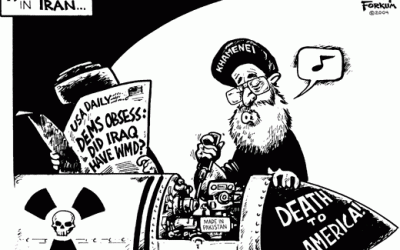Although history has shown currency devaluation to be roughly synonymous with inflation and recession, Brazil’s central bankers seem unconcerned.
Brazil’s monetary policy chief Luis Figueiredo scoffed at a September upturn in inflation which surprised many economists (though not me), saying “It’s just a seasonal thing”. When asked about concerns that the devaluation was sparking inflation, Figueiredo answered that if anything, the central bank team had reduced its expectations of devaluation’s impact on inflation.
He certainly must believe what he says, because following Brazil’s currency, the “real”, has been like watching the air go out of a balloon. Way back in 1994, when the “real plan” began, one real was worth one dollar. Almost five years later, in early 1999, 1.2 real bought a greenback. However, since May, the real has steadily trended lower, and last week, it fell to two real per dollar, a precipitous drop of -40% for the year.
Directors at the IMF implicitly endorsed ongoing devaluation, recently stating, “Directors welcomed the flexible management of the exchange rate under the new regime, with limited central bank intervention. Directors welcomed the significant improvement in competitiveness that had been achieved so far…”
What this means in plain English is “We’re glad you’re not preventing the real’s fall, because we think it’s making Brazil more ‘competitive’.”
Despite all the back patting and boasting coming from Brazil and the IMF, some numbers tell a disquieting story. Though Brazil was counting on its devalued currency to boost its export “competitiveness”, this little ploy has failed as usual. Exports in the first nine months of 1999 fell to US$35 billion from US$39.5 billion in the first nine months of 1998 (-11.2%). And of course, with the Brazilian currency able to buy less globally, imports fell even more (-16.9%, to US$35.8 billion).
And what about that other famous ill stemming from devaluation? Despite what Figueiredo says, inflation appears to be rearing its ugly head again. Over the last year, Brazilian CPI has risen about +5%, and the IMF and the central bank are congratulating themselves over this number. A recent central bank report on inflation even forecast that Brazilian inflation would fall to 3.7% in 2001. Ominously though, producer prices have jumped +13.5% and wholesale prices have surged +21% over the past year. If the costs of making things are going up, and retailers’ product costs are rising, then someday down the road, either the consumer is going to pay more or a lot of companies will lose money.
What’s worse, the Brazilian government’s tax policies appear to be adding fuel to the inflation fire. Hoping to raise cash and following the IMF’s advice, the government recently hiked taxes on corporations so that most companies will pay +8% to +23% higher tax revenues over the next two years. These companies will attempt to pass along these additional tax costs to their customers by charging higher prices.
If the Brazilian currency continues to weaken while the government looks the other way and focuses on matters like hiking taxes, global investors will soon abandon their current rosy predictions of falling inflation and economic growth.
It’s bitter irony that in the wake of all this, around the same time Robert Mundell won the Nobel Prize for Economics. Mundell’s economic policy recommendations have been summarized as: “low taxes solve recession, hard money solves inflation”.
It certainly seems that Mundell is not read down in Brazil. Translations of his texts into Portuguese should be printed and airmailed immediately.



